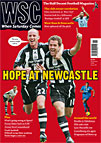 Owning a football club is now officially beyond the wildest dreams. Even Harry Pearson's
Owning a football club is now officially beyond the wildest dreams. Even Harry Pearson's
When they reach their forties, men experience a change. You begin to suspect that the manufacturers of jeans have started skimping on material, you meet young people (yes, you have started to use the phrase “young people”) that you assume are sixth-formers and when you ask politely what A-levels they are doing discover that in fact they are GPs, barristers or your new boss, and you feel strangely compelled to tell your children not to keep saying like, like all the, like, time, for goodness sake because “you’re hardly going to impress a prospective employer speaking like that”.
Worst of all, though, is the dawning realisation that you can no longer lie in bed and daydream about being a professional footballer. Because even a fantasy must have a tenuous thread attaching it to reality and, once you leave your thirties, the scoring-a-hat-trick-in-the-Cup-final thread has snapped with a reverberating twang. Unless you are Dean Windass, obviously.
You still daydream about football, of course, but the nature of the daydream changes. Where once you were spotted in the back garden dribbling effortlessly round toddlers and dogs and catapulted to fame and glory, now you write series of international best-sellers/invent a water-powered car/win the lottery four times in the same month and use the money to buy your football club. You are a model chairman. You implement all sorts of radical measures: investing equally in local young talent and top names from around the globe who “will excite the fans”, forging links with the local community, allowing kids in free for FA Cup ties, abolishing post-goal music and banishing sponsors’ names from the old-style cotton shirts the design of which remains unchanged for at least a decade.
You are a hands-off chairman – of course you are – but just every so often you pop into the dressing room and modestly offer an incisive and rather brilliant piece of tactical advice that turns the Champions League semi-final decisively in your favour (though naturally you refuse to take any credit for it despite a clamour in the media for you to succeed Fabio Capello). Soon the stadium rings with chants of praise featuring your name, while Match of the Day cameras catch you blushing humbly amid a throng of former players and adoring blondes. You are praised by Michel Platini and denounced by Sepp Blatter. One of the most important milestones in a man’s life is when he stops wanting to be the new Pelé and starts wishing he was the new Jack Walker.
That, at least, was what it used to be like. No longer. Because one of the most brutally damaging effects of the recent emergence of Premier League clubs as a rich man’s plaything, one that has not so far been touched on in the press, is the effect it has had on the fantasy chairmen of England. The influx of oligarchs and oil barons has, quite simply, pushed the price of even a moderate football club way outside the reach of even the most vivid imagination.
The news that Newcastle United would be beyond the pocket of JK Rowling was the final straw for me. £450 million? How do you dream up that kind of sum? Age has ended my fantasy of a World Cup winner’s medal and now cold, hard cash has spat in the eye of the one that replaced it. My grandad always assured me that money would ruin football. Little did I suspect that it would not only spoil the real game, it would destroy the made-up game as well.
Some may feel that the obvious solution is to daydream about buying a lower-division or non-League club instead. At first that may appear attractive. But taking a grassroots small-town club and leading them all the way up from the Conference North to the UEFA Cup is perilous. I have explored it recently and to be honest it never ends well. Your club’s new wealth breeds simmering resentment among others of similar stature, the hardcore fans are quickly alienated and replaced by glory seekers. You see yourself as a philanthropic benefactor bringing joy to a depressed corner of the north. Others see you as an opportunistic sugar daddy who has undermined fair competition. There is much talk of Gretna and Rushden & Diamonds. It is not much fun having a fantasy that is filled with visiting fans chanting: “Where were you when you were shit?”
Of course you could take over the non-League club and not shower it with your imagined riches, building it up slowly through night after night after night of hard work, endeavour and prudent financial management. But, be honest, where is the fantasy in that?
From WSC 261 November 2008